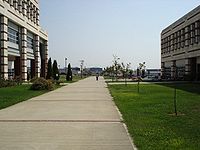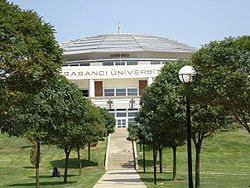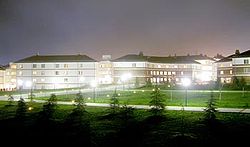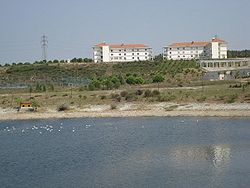
Sabanci University
Encyclopedia
Sabancı University is a private research institution located in Istanbul, Turkey. Founded in 1996. SU is a small and highly focused university with 2861 undergraduates and 624 graduates, maintaining a strong emphasis on social and natural sciences. Sabancı University is ranked #248 worldwide and #3 (after #1 Istanbul Technical University and #2 Bilkent University) nationwide in the field of engineering/technology by THE - QS World University Rankings 2009 THE - QS World University Rankings 2009 SU has been both applauded and criticized for its approach on undergraduate education, for adopting the statement of academic freedom, and for hosting controversial faculty members.
The foundation of Sabancı University became legal on June 5, 1996. once the Law 4142 passed through Parliament. On July 31, 1997 the establishment of the campus and creation of the Board of Trustees and the President were announced to the public. Sabancı University moved to the campus in September 1999 to start its first academic year with an opening ceremony on October 20, 1999.
Research, education and training will be based on learning to learn, interdisciplinary study, teamwork, fundamentals, creativity and ideal seeking. The university, through its curriculum and activities, will focus on identifying and formulating all relevant problems (challenges) as well as responding to current and future socio-technical needs.
The University will direct its research efforts primarily towards applied and strategic research with the objectives of advancing knowledge, supporting teaching and contributing to the progress of the community.
The University will cultivate its existing local and regional comparative advantages to generate, articulate, uncover and develop leading-edge knowledge in order to create competitive competencies within an international and global context. The University will take active initiative to form and to select international and global educational and research networks.
The University aspires to develop students who are competent and confident individuals, infused with a strong sense of responsibility for social change and through participatory teamwork, contribute to the development of science and technology created for the benefit of the community. Sabancı University has four faculties, listed below:
Sabancı University freshmen are enrolled in a core curriculum that consists of Elementary Calculus, Social and Political Science, Modern Turkish History, Natural Sciences, English and Turkish. In their sophomore year, students select a field of concentration without declaring a major, and are enrolled in courses that they want to pursue their undergraduate education in. Students declare major at the end of their second year, and register in their undergraduate faculties from which they receive their diplomas after completing required coursework. In undergraduate level Sabancı University offers Bachelor of Arts (B.A.) and Bachelor of Sciences (B.Sc.) degrees from Faculty of Arts and Social Sciences, and Faculty of Engineering and Natural Sciences correspondingly.
Sabanci University also offers Minor Honors Programs to provide knowledge and information in areas other than those of the student's registered diploma program. Successful undergraduate students who satisfy the specific terms and conditions, are candidates for the minor honors programs, which are offered in mathematics, physics, chemistry, and art theory and criticism.

 The main campus is located 15 km to the east of Istanbul, near the village of Orhanlı in Tuzla. Designed by the Cannon Group the main campus contains Faculty of Arts and Social Sciences, Faculty of Engineering and Natural Sciences, Faculty of Management, School of Languages and the Information Center. The construction for the campus began in late 1998, and finished in 1999.
The main campus is located 15 km to the east of Istanbul, near the village of Orhanlı in Tuzla. Designed by the Cannon Group the main campus contains Faculty of Arts and Social Sciences, Faculty of Engineering and Natural Sciences, Faculty of Management, School of Languages and the Information Center. The construction for the campus began in late 1998, and finished in 1999.
The 1,353,000 m² (330 acres) campus basically consists of 3 parts, the faculties, the dormitories and the facilities. The faculties are placed in the middle of the campus in an inverse U-shape, with FMAN and SL to the left, the University center and the main dining hall at the top, and FENS & FASS to the right. To the north of the faculties, are the residential houses, consisting of undergraduate & graduate dormitories (housing 2400 students, i.e. 75% of all students) along with faculty residences and the house of the president. To the south of the faculties are the facilities. Scattered around the lake are the Performance Center or SGM, an indoor basketball field, a gym, tennis and squash fields, and a grass soccer field.


Sakıp Sabancı Museum (SSM) is part of Sabancı University, and therefore also functions as an educational institution. In this respect, educational programmes at various levels are held in the museum, and at weekends musical events take place here. The museum website gives online coverage of both permanent and temporary exhibitions and other museum events.
The Sakıp Sabancı Museum recently hosted a Picasso exhibition, bringing together works from the Picasso Museums in Paris and Barcelona, Lille Modern Art Museum, Fundación Almine y Bernard Ruiz-Picasso para el Arte (FABA), and the family collections, selected by Picasso's grandson Bernard Ruiz-Picasso. In addition, the exhibition featured photographs of the artist taken by famous photographers.
Although a private institution, Sabancı University offers considerable financial aid; 29% of all students studying at the university with tuition scholarships, and more than 40% of all students receive some sort of financial aid.
History
In Turkey, private foundations obtained the right to establish and develop universities. In July 1994, the Sabancı Group decided to establish a university.The foundation of Sabancı University became legal on June 5, 1996. once the Law 4142 passed through Parliament. On July 31, 1997 the establishment of the campus and creation of the Board of Trustees and the President were announced to the public. Sabancı University moved to the campus in September 1999 to start its first academic year with an opening ceremony on October 20, 1999.
Philosophy
The University and its structure will be participative, self managing, financially self-sustaining and flexible at all levels and functions (research, education and administration). Within these guidelines, the University will be appropriately responsible and responsive to all stakeholders, including students, their families, faculty, staff, administrators and society-at-large.Research, education and training will be based on learning to learn, interdisciplinary study, teamwork, fundamentals, creativity and ideal seeking. The university, through its curriculum and activities, will focus on identifying and formulating all relevant problems (challenges) as well as responding to current and future socio-technical needs.
The University will direct its research efforts primarily towards applied and strategic research with the objectives of advancing knowledge, supporting teaching and contributing to the progress of the community.
The University will cultivate its existing local and regional comparative advantages to generate, articulate, uncover and develop leading-edge knowledge in order to create competitive competencies within an international and global context. The University will take active initiative to form and to select international and global educational and research networks.
Academics
Undergraduate and graduate programs at Sabancı University differ in their design and approach from those programs of other universities. The principles that form the foundation of Sabancı University's academic programs and institutional structure are based on an interdisciplinary approach with the absence of traditional departments. Hence, this organizational model allows different faculties to interact and collaborate in contrast to the traditional structures composed of discrete institutional units.The University aspires to develop students who are competent and confident individuals, infused with a strong sense of responsibility for social change and through participatory teamwork, contribute to the development of science and technology created for the benefit of the community. Sabancı University has four faculties, listed below:
- The Faculty of Arts and Social Sciences, including Istanbul Policy Center
- The Faculty of Engineering and Natural Sciences
- The Faculty of Management
- School of Languages
Undergraduate
The interdisciplinary design of the academic programs offered by the Faculty of Engineering and Natural Sciences (FENS) and the Faculty of Arts and Social Sciences (FASS) prepares students for the diverse challenges of modernity and technology. All students experience a two-tier common program that exposes them to a broad variety of disciplines and approaches. The University Courses in the first tier assist students in acquiring interdisciplinary thinking skills and a holistic knowledge base as well as discipline-specific content. Second tier Faculty Courses familiarize students with the undergraduate programs to assist them in their choice of field at the end of the second year. Students declare majors in their field of interest and choice after the experience of a two-year-based curriculum. The students, placed into the Faculties according to their University Entrance Exam results, have the opportunity to formally declare their majors after the two-year common program. Delayed major declaration enables more informed and mature career decisions. Prior to the core curriculum, students not yet at proficiency level enroll in the one-year School of Languages (SL) since English is the medium of instruction at Sabancı University.Sabancı University freshmen are enrolled in a core curriculum that consists of Elementary Calculus, Social and Political Science, Modern Turkish History, Natural Sciences, English and Turkish. In their sophomore year, students select a field of concentration without declaring a major, and are enrolled in courses that they want to pursue their undergraduate education in. Students declare major at the end of their second year, and register in their undergraduate faculties from which they receive their diplomas after completing required coursework. In undergraduate level Sabancı University offers Bachelor of Arts (B.A.) and Bachelor of Sciences (B.Sc.) degrees from Faculty of Arts and Social Sciences, and Faculty of Engineering and Natural Sciences correspondingly.
Sabanci University also offers Minor Honors Programs to provide knowledge and information in areas other than those of the student's registered diploma program. Successful undergraduate students who satisfy the specific terms and conditions, are candidates for the minor honors programs, which are offered in mathematics, physics, chemistry, and art theory and criticism.

Graduate
Graduate study at Sabancı University places major emphasis on the advancement of knowledge through research. Academic efforts based on this vision support the development of next generation of scholars and provide the ability to transform the results of scientific activity into public benefit. Sabanci University offers Master of Arts (M.A.) from the Faculty of Arts and Social Sciences, Master of Sciences (M.Sc.) from the Faculty of Engineering and Natural Sciences, Master of Business Administration from the Faculty of Management, and Doctorate of Philosophy (Ph.D.) from all three faculties.Campus

The 1,353,000 m² (330 acres) campus basically consists of 3 parts, the faculties, the dormitories and the facilities. The faculties are placed in the middle of the campus in an inverse U-shape, with FMAN and SL to the left, the University center and the main dining hall at the top, and FENS & FASS to the right. To the north of the faculties, are the residential houses, consisting of undergraduate & graduate dormitories (housing 2400 students, i.e. 75% of all students) along with faculty residences and the house of the president. To the south of the faculties are the facilities. Scattered around the lake are the Performance Center or SGM, an indoor basketball field, a gym, tennis and squash fields, and a grass soccer field.

Sabancı Performing Arts Center
Sabancı University campus also contains the Sabancı Performing Arts Center (SGM), which is a thousand seat, concert and performing arts venue. Finished in 2004, SGM since hosted both nationally and internationally famed orchestras, bands and other performances.Sakıp Sabancı Museum

Sakıp Sabancı Museum (SSM) is part of Sabancı University, and therefore also functions as an educational institution. In this respect, educational programmes at various levels are held in the museum, and at weekends musical events take place here. The museum website gives online coverage of both permanent and temporary exhibitions and other museum events.
The Sakıp Sabancı Museum recently hosted a Picasso exhibition, bringing together works from the Picasso Museums in Paris and Barcelona, Lille Modern Art Museum, Fundación Almine y Bernard Ruiz-Picasso para el Arte (FABA), and the family collections, selected by Picasso's grandson Bernard Ruiz-Picasso. In addition, the exhibition featured photographs of the artist taken by famous photographers.
Student body
Sabancı University has 3485 students, of whom 2861 are undergraduates and 624 are graduates. Females make up 40% of the student body. Sabancı University hosts an extremely selective undergraduate population; about 0,01% of the undergraduates rank in the top 1000 of students who take the annual Turkish University Entrance Examination, and 2,5% rank in the top 3000. Forty percent (40%) of the student body come from private high schools. The university draws from over 5 different cities in Turkey.Although a private institution, Sabancı University offers considerable financial aid; 29% of all students studying at the university with tuition scholarships, and more than 40% of all students receive some sort of financial aid.
Alumni
Since 2000, Sabancı University has conferred a total of 2274 undergraduate and 1291 graduate degrees.Notable faculty
- Ahmet AlkanAhmet AlkanAhmet Ugur Alkan is a Turkish economist and the former dean of Faculty of Arts and Social Sciences at Sabanci University, Istanbul, Turkey.-External links:*...
- Ahmet Nihat Berker
- Erdal İnönüErdal InönüErdal İnönü was a Turkish physicist and politician. He was the son of Turkey's second president İsmet İnönü...
, former Deputy Prime Minister of Turkey, founder of TUBITAKTÜBITAKThe Scientific and Technological Research Council of Turkey is the main body responsible for organizing research and development activities on the national level in Turkey, with headquarters located in Ankara.-History:... - Ersin KalaycıoğluErsin KalayciogluMahmut Ersin Kalaycıoğlu is a Turkish political scientist,Professor of Political Sciences at Sabanci University and former President of Işık University, Istanbul . He is also a nephew of the well-known Turkish constitution professor, Tarık Zafer Tunaya.Prof...
- Halil BerktayHalil BerktayHalil Berktay is a Turkish historian at Sabancı University and columnist for the daily Taraf.-Biography:Berktay was born into an intellectual Turkish Communist family. His father, Erdogan Berktay, was a member of the old clandestine Communist Party of Turkey...
- Ibrahim al-MarashiIbrahim al-MarashiDr. Ibrahim al-Marashi is a historian researching the Middle East and political communications. He holds a DPhil in History from Oxford University , where his thesis was on the Iraqi invasion of Kuwait...
- Tosun TerzioğluTosun TerziogluTosun Terzioğlu is a Turkish mathematician and academic administrator.Terzioğlu was born in İstanbul, Turkey. He graduated from Robert College in 1961. He studied mathematics at Newcastle University, UK and received his BS in 1965. He earned his PhD from Frankfurt University in Germany in 1968...

